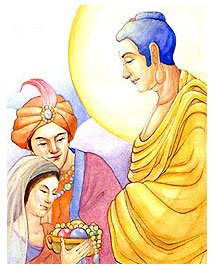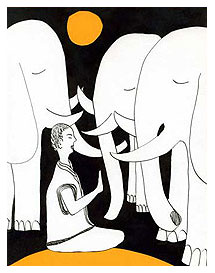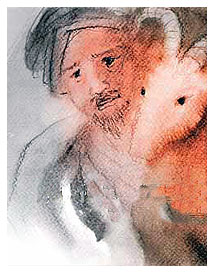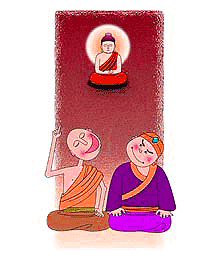Queen Mallika Upholding the Precepts, Not Accepting Fragrant Adornments
 During the time that Buddha was dwelling in Sravasti teaching to numerous sentient beings, within the kingdom there lived an important merchant who owned many pieces of precious bodily adornments, including valuable necklaces and all kinds of fine gems. One day, he decided to offer all of these precious jewels to King Prasenajit. The king was very delighted about this, and sent out one of his men to ask all his wives to come out, declaring he would award these exquisite ornaments to the most beautiful one among them. During the time that Buddha was dwelling in Sravasti teaching to numerous sentient beings, within the kingdom there lived an important merchant who owned many pieces of precious bodily adornments, including valuable necklaces and all kinds of fine gems. One day, he decided to offer all of these precious jewels to King Prasenajit. The king was very delighted about this, and sent out one of his men to ask all his wives to come out, declaring he would award these exquisite ornaments to the most beautiful one among them.
After the news was announced, the wives at once dressed themselves up as best as they could, and in order came to present themselves in front of the king, with the hope that they would be the one to receive these treasured items. The king saw that Queen Mallika was the only one absent among them, and so asked his attendant as to her whereabouts. His attendant replied, “Today the lady is observing the eight prohibitive and fasting precepts1, which keep her from decorating herself with any makeup and ornaments, so she decided to stay in her room.” The king was very unhappy, and sent his attendant to ask her to come out. When Queen Mallika finally appeared, wearing her simple apparel devoid of any adornments, as well as not having applied any cosmetics, her entire body nevertheless managed to radiate out a dazzling light, and looked even more dignified and majestic than usual.
The king was very surprised, and asked Queen Mallika, “What is it that makes you look so much different than everyone else here?” She answered, “Because throughout continuous kalpas I've cultivated such a small amount of merit, so in this lifetime my accumulated negative karma causes me to attach to my desires. Besides, life is brief and temporary. If we don't work hard in our cultivation, it will be very easy for us to fall into the three evil paths. Therefore, I now every month receive and uphold the eight precepts, abandon my strong greed and desires, and follow the teachings of the Buddha. With these practices, I hope I can receive the benefits of the Dharma.”
The king became very happy and decided to bestow Queen Mallika with the precious ornaments. However, she responded, “Today I am upholding the eight precepts, and it would therefore not be suitable to wear these jewelries. Please give it to somebody else.” The king said, “My intention is to award these precious items to the most beautiful woman here, and among them you are the most beautiful and dignified. Moreover, by following the eight precepts of the Buddha, your state of mind is holy and pure, which makes people love and respect you. If you do not accept this gift, what could I possibly do?” She answered, “Please come with me Your Highness, and we will go and offer these ornaments to the Buddha.”
So King Prasenajit and Queen Mallika brought along the top ministers and went to the temple where the Buddha was staying. After prostrating in front of the Buddha, the king, holding the jewels in his hands, spoke to the Buddha. “Queen Mallika, due to her upholding of the eight precepts, does not possess the mind of desire, and therefore graciously declined this precious gift which I offered to her. We've therefore specially come here to offer this treasure to you, and I hope that you will mercifully accept it.” The king also asked, “Receiving and upholding the eight precepts and believing in the Dharma, is there any merit in this?” The Buddha mercifully accepted the ornament, and for all those present uttered a verse, the meaning of which is as follows:
“Even the wonderful aromas of the world's most fragrant sandalwood or lotus flower would still be much weaker than the aroma sent out from one who practices the eight precepts. If one's actions can stay in accord with the precepts and can maintain good moral conduct, that person will be bound to distance him/herself from all his/her faults and errors, therefore freeing oneself from all vexations as well as from birth and death.”
The Buddha told King Prasenajit, “The merits obtained from upholding these precepts are vast and long-lasting, and will result in practitioners attaining good reputation and receiving high respect from their peers. Even if you took all the treasures of the entire world and gave them as offerings, all of the merit that you receive would not be as great as what Queen Mallika attains in a single day of maintaining the precepts. Upholding the eight precepts can help free oneself from vexations, thereby attaining nirvana. These kinds of merits cannot be compared to worldly merits.” After the Buddha finished speaking, everyone was greatly pleased and with resolution followed the Buddha's instructions, and embraced the Dharma.
1. The Eight Prohibitive and Fasting Precepts: Also called the Eight Precepts. It was established by the Buddha for the laity to temporarily experience the monastic life. The preceptee shall leave his/her family for one day and one night, and live with the Sangha to learn the monastic way of life, and refrain from killing, stealing, sexual conducts, telling lies, taking intoxicants, wearing garlands, jewelry, and perfume, dancing, singing, playing music, sitting or lying on grand, luxurious seats or beds, and taking food after midday.
Reflection
Compositions that are elegantly written but with shallow meaning will not have the power to stir people's emotions. Similarly, people with an attractive exterior but lacking an elevated soul will be unable to earn people's respect. Therefore, people with wisdom will not solely in order to please other people dress themselves up to look pretty, but instead will constantly pay attention to improving one's cultivation.
When upholding the eight precepts, because one's desires and attachments to valuable objects will lessen, this person’s merit will grow. Also, by concentrating his mind on cultivating the spiritual life, one can then expand one’s wisdom. Therefore, upholding the precepts is a method of cultivation that increases both our merit and wisdom. (TOP) |
The Imperial Cook: Upholding the Precepts
 A hundred years after the Buddha’s parinirvana, there was a king who still worshipped ancient gods and practiced sacrificial rites. He would command his imperial cooks to slaughter hundreds of cows, sheep, chickens, dogs and pigs. One of his cooks was a Buddhist, however, who upheld the precepts and refused to take the life of any sentient beings. His behavior made the kitchen officials exceedingly angry, and they reported him to the king for punishment. A hundred years after the Buddha’s parinirvana, there was a king who still worshipped ancient gods and practiced sacrificial rites. He would command his imperial cooks to slaughter hundreds of cows, sheep, chickens, dogs and pigs. One of his cooks was a Buddhist, however, who upheld the precepts and refused to take the life of any sentient beings. His behavior made the kitchen officials exceedingly angry, and they reported him to the king for punishment.
The king summoned the cook and said, “Those who disobey orders must suffer the death penalty.” In reply, the cook said, “I am a Buddhist and have taken the five precepts. I follow the Buddhist teachings and would rather sacrifice my own life than harm others.” The cook went on to say that if he did as the king ordered and killed these animals, not only will his life be cut short, but he will enter the hell realm and endure endless suffering for his actions. Not until his misdeeds have been atoned will he be freed from the realm of suffering. On the other hand, by observing the precepts, even if the king chose to execute him, he will be reborn in heaven and be blessed with his heart’s every desire. These are two very different consequences, hence, he would much rather die than violate the precept of no killing.
After listening to the cook, the king said, “In seven days I will let loose a herd of five hundred elephants to trample you underfoot. If you do not die, this will prove that what you say is true.” Seven days later, the cook faced the herd of five hundred powerful elephants with the dignity and serenity of a buddha. As the elephants charged towards him at great speed, on the brink of certain death, the cook raised his five fingers. Like the Buddha himself when confronted by five hundred elephants, in a flash his five fingers became mountains, and in between each mountain were roaring lions. Upon seeing the lions, the elephants prostrated themselves on the ground, petrified and panic-stricken. He had subdued the elephants the same way the Buddha did.
Having seen this miracle with his own eyes, the king finally believed in the existence of the Buddha. Right away he decided the worship and sacrifices to the ancient gods must stop. Afterward, all the court, from the highest ministers to the lowest servants, accepted the teachings and precepts of Buddhism. What happened to the cook? He became a monk and served as spiritual advisor to the king, trusted and revered by all. His story shows that by upholding the precepts, it is possible to inspire others to do the same.
Reflection
Before the Buddha’s parinirvana, he adjured his disciples to follow the Dharma and accept the precepts. If practitioners did not uphold the precepts, they would become like trees without roots, unable to grow properly. Therefore, the precepts are the stepping stones towards nirvana, helping to develop samadhi (deep meditation) and wisdom, promoting myriad merits. Buddhist practitioners should not deviate an inch from their precepts, in order that they may attain Buddhahood themselves and also strengthen the belief and understanding of Buddhism in others, benefitting themselves and others at the same time.(TOP) |
The Offerings of a Miser
 Long ago, there lived a rich old man who was a lecher and skinflint by nature. He lusted after pleasure but couldn’t bear to part with his money. Long ago, there lived a rich old man who was a lecher and skinflint by nature. He lusted after pleasure but couldn’t bear to part with his money.
One twilit evening, with the clouds tinged a delicate rosy shade and a light breeze blowing, the old man was in his garden. The cones on the old pine tree rustled gently and, in this scene of tranquility, the old miser was overcome by a hankering for lamb. Suddenly, a brainwave! He had an idea how to eat as much lamb as he wanted without paying for it and without losing face.
The old man told his servant to bring his sons to him. When his sons arrived, they found their father in a posture of prayer, solemnly intoning, “Tree Spirit! Tree Spirit! Please continue to bless this house! Please bless us! Please bless us!”Then, the old man turned around and exclaimed, “My sons! Why are we so blessed? Verily because of this old pine tree! You should offer sacrifices to the Tree Spirit every year.” The young men followed their father’s injunction, and immediately slaughtered a great number of lambs, and moreover, built a shrine for offering sacrifices to the Tree Spirit. As he had intended, the old man was soon supping on lamb and felt most satisfied with himself.
Year by year, the old man weakened, and at last he fell gravely ill. Just before the end, he dreamed that a herd of sheep came and demanded his life. As a result, in his next life he became a lamb in his very own flock of sheep.
When the day of worship came round again, the old man’s sons chose to sacrifice the lamb which was actually their father’s new incarnation. Only now did remorse enter the old man’s heart: “My sons! This old pine tree is just an old pine tree. I just wanted to satisfy my appetite. Please don’t keep piling wrong on wrong; otherwise, there can be no escape from suffering.” Just at the moment the old man’s sons picked up their butcher’s knives, an Arhat passed by begging for food and prevented the slaughter.
Pointing to the lamb, the Arhat said, “Don’t kill it! This lamb is your father!” Through divine power, the sons saw the lamb’s previous incarnation. Seeing this, the old man’s sons could not contain their tears and swore the oath, “From now on, I will never kill! I will only do good deeds to plant the fields of blessings, and make offerings to the Three Jewels.”
Reflection
In the cycle of rebirth through the six realms, one can never escape the principle of causality. The Buddhist scripture says that all sentient beings were our parents in our past lives. When facing other creatures, should we be greedy or compassionate? (TOP) |
Sweetness and Light
 A long time ago in India there was a King named Ashoka. Although King Ashoka had not attained enlightenment, he not only believed in Buddhism but also performed all kinds of good deeds. For example, he built eighty thousand pagodas in a single day! As well as building the pagodas, he made offerings to many Buddhist masters, and respectfully asked to receive their teachings. In this way he passed days without end. A long time ago in India there was a King named Ashoka. Although King Ashoka had not attained enlightenment, he not only believed in Buddhism but also performed all kinds of good deeds. For example, he built eighty thousand pagodas in a single day! As well as building the pagodas, he made offerings to many Buddhist masters, and respectfully asked to receive their teachings. In this way he passed days without end.
One day, King Ashoka was giving meals to the monks when he noticed a particularly solemn-looking and learned young master. Perfectly at ease, he sat down next to the king and got ready to speak. All of a sudden, the king found that a pleasant fragrance came from the master’s mouth. Confused, the king thought to himself, “He must have something hidden in his mouth. Is he trying to deceive my people by means of this scent?” So he asked the young master to open his mouth. After careful examination, he found there was really nothing inside. In disbelief, the king asked the young master to rinse his mouth. He did so, but afterwards the fragrance was still there as powerful as before.
The king couldn’t help asking the master, “Please tell, Master. Why is there such a smell coming from your mouth? I have never smelt anything like it.” The master replied, “Your highness. This can be traced back to long ago. In the time of Kassapa Buddha, I was a wise and eloquent Master who publicly praised the Buddha’s virtues, and taught people how to cultivate themselves in the light of the true teachings. From that time on, in every incarnation, this rich fragrance, incomparable in nature, has emanated from my mouth, and whoever smells it is uplifted.”
After the king heard the young Master’s story, he was overjoyed, “So it turns out that the result of praising the Buddha is beyond compare!” The young Master went on to say, “Ten great blessings, yet more incredible, come from praising the Buddha. Your highness, please listen carefully…
1. Whoever praises the Buddha in word and deed, and allows sentient beings to hear his teachings, shall have a good name.
2. Whoever praises the Buddha and thus gladdens the hearts of sentient beings shall have a noble appearance.
3. Whoever instructs sentient beings in eradicating sin, and helps them find peace, shall attain boundless joy.
4. Whoever praises the Buddha, and thus dispels the afflictions of sentient beings, shall be always be respected by others.
5. Whoever by the light of their teaching brightens the spirits of sentient beings, and brings them to enlightenment, shall inspire feelings of awe like the sun.
6. Whoever uses every possible means to praise the Buddha and bring joy to sentient beings shall receive esteem and love.
7. Whoever uses every possible word to praise Buddha’s boundless virtue shall be rewarded with unmatched eloquence.
8. Whoever praises the Buddha’s matchless virtue and enables sentient beings to refrain from sin shall gain wisdom, pure and deep.
9. Whoever praises the Buddha and removes the vexations of sentient beings shall be free of ignorance and defilement.
10. Whoever by removing the afflictions of oneself and others reaches nirvana shall testify to the power of the Buddha’s teaching, which like heavy rain not only extinguishes the fire but also quells the smoldering ashes.
Having heard the young Master describe the unparalleled benefits of praising the Buddha’s virtue, King Ashoka reached a deep understanding and joyously said, “Those who are blessed with great good fortune are able to praise the virtues of the Buddha.”
Reflection
Praising the Buddha brings unique rewards; in praising the Buddha with respectful words and gestures, such that one’s heart is filled with joy at the Buddha’s thirty-two aspects and eighty manifestations, one can escape sin and folly. When one single-mindedly chant the Buddha’s name and praise the Buddha, one can attain the ten great blessings of praising the Buddha.
When we are whole-heartedly praising and spreading the virtues of the Buddha, at that moment we are free from our false ego, selfishness and hatred. Thereafter, our attachment and affliction will diminish, and our inherent blessing and virtue will clearly manifest. (TOP) |
Cutting Down the Tree to Reap the Fruit
 Once there was a tall, verdant tree at a royal court. The tree was richly laden with ripe, lush fruits, however, the tree was very tall. One day a man came to this royal court. The king asked him, “This tree has wonderful fruits but all the branches are too high. Can you think of a way to get at the fruits?” Once there was a tall, verdant tree at a royal court. The tree was richly laden with ripe, lush fruits, however, the tree was very tall. One day a man came to this royal court. The king asked him, “This tree has wonderful fruits but all the branches are too high. Can you think of a way to get at the fruits?”
The man replied, “Although this tree is very tall, there is still a way to get at its delicious fruits.” Then without more ado, the man took an axe and felled the tree. He expected it would be easy to pick the fruits once they became ripe. However, they waited and waited, but no fruits ever grew on the tree anymore. In fact the tree had withered and died.
The precept tree of the Buddha grows wonderful fruits. If we want to eat the fruits, we must keep the precepts and practice good deeds. A person who breaks the precepts is like the man who chopped down the tree. When the tree is dead and the roots dried up, it would be impossible to restore its life.
Reflection
The sutra says, “The precepts are the root of perfect wisdom. One should single-mindedly uphold the precepts. If one can firmly uphold the precepts, then one will be praised by all Buddhas. ” The precepts are the well-spring of all attainment! Through observing the precepts, we examine our actions, words and thoughts every moment. When our thoughts are pure, we are on our way to enlightenment. (TOP) |
